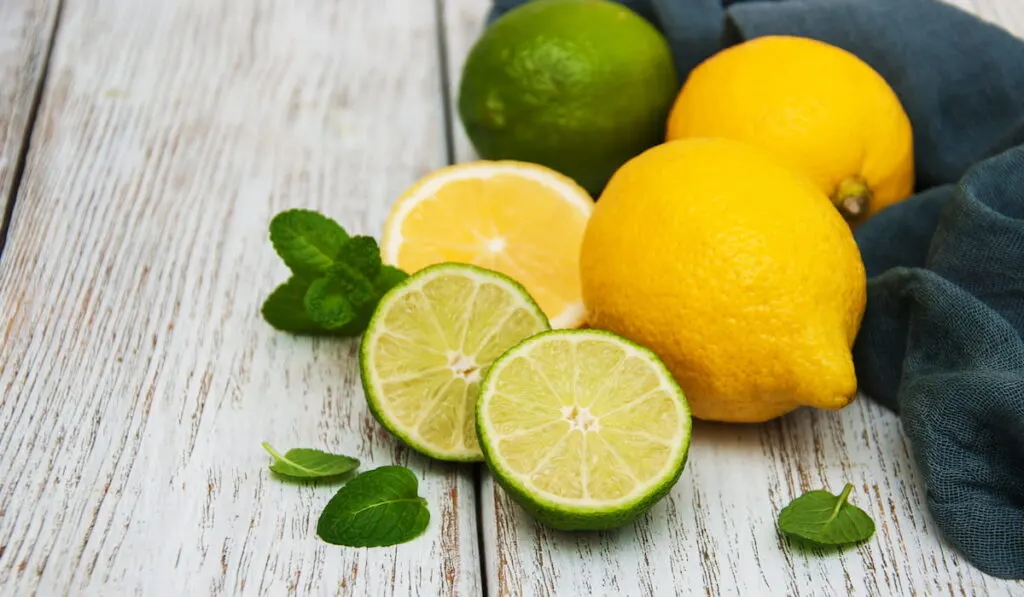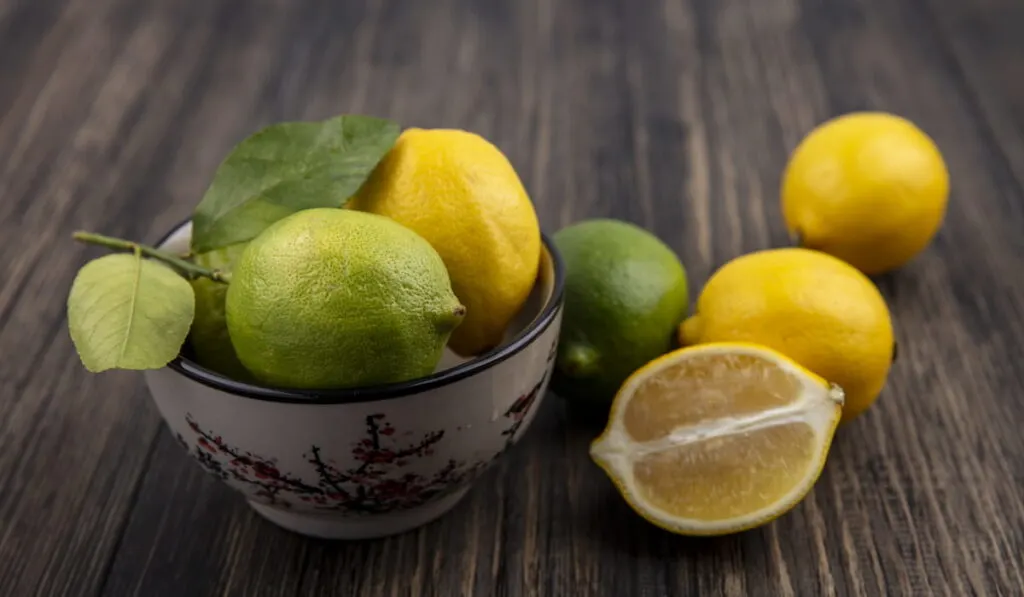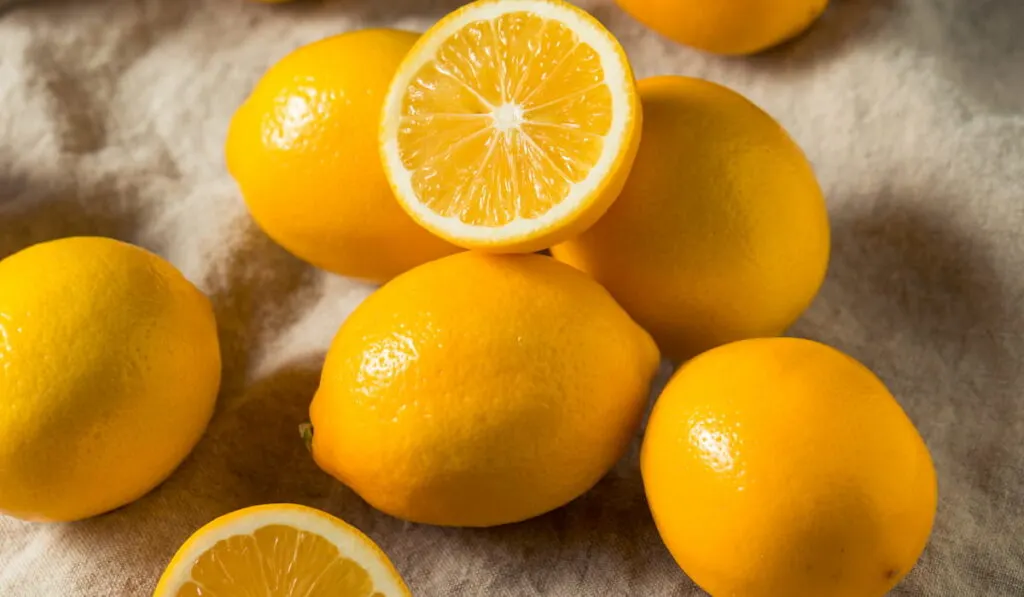Both limes and lemons are an excellent choice when it comes to citrus fruit.
You can add them to various kinds of dessert recipes or you can just squirt a couple of drops over your food to enhance the flavor.
And don’t forget delicious limeade or lemonade. A glass of delicious refreshment full of specific and acidic flavors during warmer days – most of us can’t say “no” to that.
Coupled with that, what’s a good margarita without a little bit of lime?
They are excellent in the form of essential oils as well as many other things, but, the question remains – what’s the difference between limes and lemons?

Are limes just an unripe stage of lemons? Is it a good or bad thing when they turn yellow?
Let’s investigate some interesting lime-lemon facts you might like to know.
Table of Contents
Do Limes Turn Into Lemons? What’s The Difference Between Them?
Citrus trees have various characteristics that can help you differentiate them from other types of (non)fruiting trees.
But it’s not easy to identify differences among certain citrus trees.
Lemon and lime are especially hard to differentiate because their fruit and blossoms often look quite similar – especially in the beginning when they aren’t completely ripe.
Some people think limes are nothing but unripe lemons because they also turn yellow when they are completely ripe.
This is not the case. Even though they are similar, there are still obvious differences between them.
Most notably, their taste.
Lemons have a sour taste, while limes are more bitter. They are quite similar and closely related, but their genetics are actually different
Plus you won’t find them in the same environments.
For instance, if you travel to subtropical and tropical countries, you will see they often serve limes, and not lemons – because that’s the area where they grow.
On the other hand, lemons are something you will find more in countries with moderate climates.
You can see the difference in the way they look, too. Limes are rounder and about half the size of lemons, whose shape is more oval.

So, do limes turn into lemons?
Limes do not turn into lemons. It also doesn’t work the opposite way – if you pick an unripe lemon, you won’t be holding a lime in your hands.
So, Why Are Some Limes Yellow? Are They Unripe?
You probably imagine a green fruit when someone mentions limes.
The thing is, limes are underripe when you see them in green. If you leave them to fully ripen on the tree, you’ll get pale yellow fruits.
We don’t usually get to see limes like that in supermarket because commercial farmers strip all the fruits while they’re still green.
It’s important to prolong their after-travel quality since limes are mostly imported from (sub)tropical countries.
The same thing happens as with any type of fruit – you will never get the same version if you buy it at the supermarket as if you grow it in your garden, where you can track all stages your fruit goes through.
In addition to that, leaving green limes on the counter won’t give them the yellow color you might want because they only ripen when on the tree.
Mangoes and bananas will improve if you give them a couple of days after the purchase, but that’s not the case with most citrus.
As a matter of fact, when they’re at room temperature they are more likely to dry out and toughen, so it’s better to store them in the fridge – especially if you want to keep them a little bit longer.
Can They Cross Pollinate? Is There A Lemon Lime Hybrid Tree?

Lemon trees usually grow up to 20 feet. They have big and specifically oblong leaves and quite broad branches, while the lime trees have smaller leaves.
They are also more slender and shorter. Limes and lemons are members of the same genus, so it’s highly possible and quite likely for them to cross-pollinate when you plant them next to each other.
This process won’t affect the parent trees; it will only make changes on plant seeds.
Both your lemon and lime trees will continue to give all those beautiful fruits, but if you save their seeds, you have a genetic material that can result in fruits that carry their combined characteristics.
It’s actually quite easy to cross-pollinate citrus plants because of their genetics – plus, there are lots of different forms you can get out of that process.
For instance, Meyer lemon is a hybrid form and a cross of a mandarin/pomelo and citron.
It’s specific because of a thick and deeper yellow rind. Meyer lemons are bigger than average-sized lemon and moderately sweet.
Sometimes, people genetically manipulate citruses just to come up with a product that will sell better – clementines and seedless lemons are a perfect example of that.
Clementines are quite tasty and similar to oranges, but it’s much easier to remove their thin peels. Likewise, seedless lemons are easier to make juice from.
Plenty of citrus fruits we see in the supermarket are a product of the cross-pollination process – customers like to have various options, especially when they come in the simpler and equally tasty form.
Sometimes, genetic crossovers come as a result of farmer’s work and sometimes it happens naturally.
Do lemon-lime hybrid trees exist?
There is a lemon-lime hybrid tree. To be precise – there are several kinds of them.

These certainly come as an excellent solution for those who don’t have enough space in the backyard but would still prefer to have some different types of citrus trees in their garden.
For instance, you’ll really enjoy the cocktail lime-lemon tree that provides a tasty combo of Key Limes and Meyer Lemons.
Final Words
Limes and lemons are always a great choice – whether you enjoy them separately or decide to do a crossover in order to get some new hybrids with fresh flavors.
Citrus plants have genetics that allow you to play around with their forms and come up with plenty of tasty cross-pollinated combinations you will like.
Considering that, don’t hesitate to share some of your own discoveries with us! Do you have your own favorite lemon-lime or some other citrus combo?
Sources:
- https://homeguides.sfgate.com/tell-lemon-lime-tree-39624.html
- https://www.gardeningknowhow.com/edible/fruits/lime/what-to-do-with-yellow-limes.htm
- https://foodsguy.com/are-limes-unripe-lemons/
- https://www.epicurious.com/expert-advice/are-yellow-limes-better-than-green-ones-article#:~:text=The%20truth%20is%20that%20when,was%20still%20on%20the%20tree.
- https://farmityourself.com/can-lemon-and-lime-trees-cross-pollinate/#What_Happens_When_Lemon_and_Lime_Trees_CrossPollinate
- https://www.citrus.com/blog/is-there-a-lemon-lime-tree/
- https://farmityourself.com/can-lemon-and-lime-trees-cross-pollinate.
